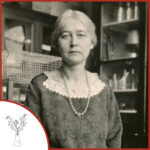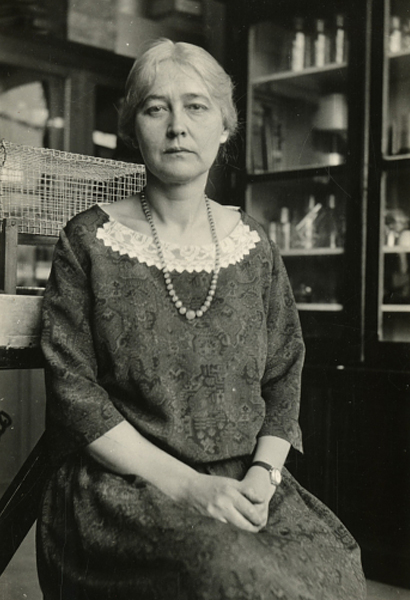

Birth: March 20, 1879
Death: July 26, 1907
Specialty: Organic chemistry
Major Contributions:
Michaelis-Menten Kinetics
Contributed to science of histochemistry
Canadian Medical Hall of Fame
Image: Smithsonian Institution Archives
One of the first Canadian-born women to become a medical doctor, Maud Lenora Menten, was born on March 20th in 1879. She was educated at the University of Toronto, earning both a bachelor’s and master’s degree in the early 1900s. Her research for the next few years centered on investigating the use of radium bromide in the treatment of cancer cells in rats while working as a fellow at the Rockefeller Institute for Medical Research.
She returned to Toronto to study medicine, becoming an MD in 1911, after which she traveled to Berlin to work with biochemist Leonor Michaelis and enzyme kinetics. Working together they developed the Michaelis-Menten hypothesis that was used to explain the mechanism and velocity of reversible reactions between enzymes and their substrates, which is the molecule the enzyme is acting on. As part of their hypothesis, they created the Michaelis-Menten equation that includes the Michaelis constant. All these pieces were formally presented in 1912-1913 as Michaelis-Menten Kinetics.
While working in cancer research at the University of Cleveland, Menton earned her doctorate in biochemistry in 1916 and obtained a position at the University of Pittsburgh. She was later promoted to a professor of pathology. In her career she published over seventy papers that included investigating the mobility of proteins in the presence of electric fields, now called electrophoresis, which is currently used for DNA and RNA analysis. She also contributed to the discovery of a dye-based reaction that tests for the presence of certain enzymes in the kidneys that can indicate renal and liver function. This was a major development in the field of histochemistry, which is the staining of cells with chemicals that enable the creation of color and contrast in microscopic images making them easier to study.
Menten retired from the University of Pittsburgh in 1950 but continued her research until her health made that impossible. She passed away in 1960 and was inducted into the Canadian Medical Hall of Fame in 1998. She is honored yearly with the Dr. Maud L. Menten Memorial Lecture Series in the Department of Biochemistry at the University of Western Ontario and the annual Maud L. Menten Lecture and the Maud L. Menten Professorship in Experimental Pathology at the University of Pittsburgh.
Written by Angela Goad
Sources:
Encyclopedia Britannica: Maud Leonora Menten
Wikipedia: Maud Leonora Menten
Smithsonian Institution Archives: Maud Leonora Menten
Histochemistry: Live and In Color
See Also:
Chemical Heritage Foundation: Leonor Michaelis and Maud Leonora Menten
Wikipedia: Michaelis-Menten kinetics
